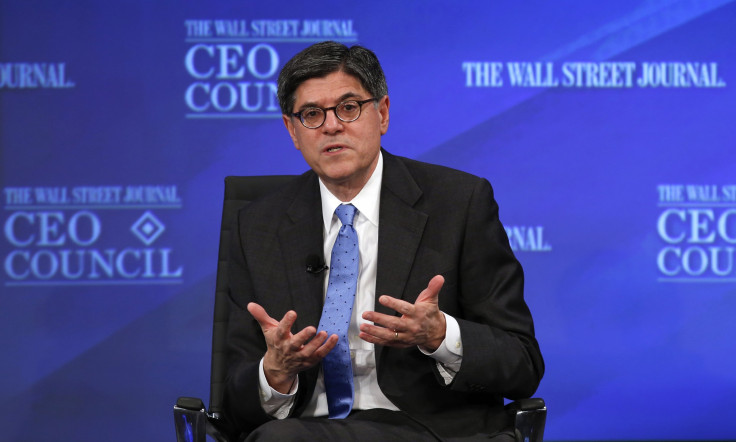Lew: Extend Debt Limit In Advance

The best outcome for the ongoing budget conference on Capitol Hill, said Treasury Secretary Jack Lew, is to lay out a clear path on tax and entitlement reforms and replace the sequester.
Lew was a guest speaker at the Wall Street Journal’s CEO Council on Tuesday, a gathering of business leaders hosted at the Four Seasons Hotel in Washington, D.C. Weighing-in on the budget negotiations between House and Senate conferees, Lew said he doesn’t want to get ahead of the process but believes President Barack Obama’s budget blueprint is the way forward.
Obama proposed a $3.8 trillion budget to Congress in April that includes a mixture of tax increases on the wealthy and controversial cuts to entitlement programs like Social Security and Medicare. The aim of the White House’s plan is to reap $1.8 trillion in deficit reduction over the next decade and replace the sequester spending cuts that took effect in March. It would also reduce the cost-of-living adjustments for Social Security recipients.
“I think the president’s budget is a blueprint that were we to follow it would give the economy the kind of certainty and tailwind it needs to grow,” Lew said.
The secretary said that the bipartisan group of negotiators could produce many possibilities by the Dec. 13 deadline, but that an agreement will be a good sign to the public.
“I actually think that anything they do to show that they can work together … would instill some confidence both in the process and in the substance,” he said. “The challenge of doing something really big is that both sides have to do something really hard.
“We’ve made clear that in order to do the kind of entitlement reforms that are in the president’s budget it would require moving a tax reform and raising some additional revenue,” Lew added. “If that’s not a possibility for the Republicans then something large is not likely. But there’s other ways for these conferees to work things out but I’ll leave it to them.”
A compromise on taxes and entitlements has always been elusive to lawmakers, and this time around, the hopes aren’t high that they will achieve it.
Republicans are already showing no appetite for having a debate on taxes.
“If this conference becomes an argument about taxes, we’re not going to get anywhere,” House Budget Committee Chair Paul Ryan, R-Wis., told the conference committee last month. “The way to raise revenue is to grow the economy. We need to write a tax code that encourages economic growth -- not stifle it.”
But Democrats are arguing that a compromise cuts both ways.
“While we scour programs to identify savings, Republicans have to work with us to scour the bloated tax code and close loopholes used by the wealthiest Americans and corporations to replace the other half of sequestration,” wrote Sen. Pat Murray, the Senate’s Budget Committee chair, in a recent Washington Post op-ed.
Those involved in the negotiation aren’t running scared of missing the December deadline. After all, the federal government is funded until mid-January and the debt ceiling doesn’t need to be raised until Feb. 7.
But Lew issued a call to lawmakers to act on extending the debt limit early instead of waiting until last minute. Both Democrats and Republicans have taken a hit in the public’s eye, the latter more so, after a disagreement resulted in a government shutdown last month that furloughed hundreds of thousands of federal employees for almost two weeks.
“I think that if you look at the things that Republican leaders have said since October, it’s clear that this was not a good experience either for the country or for them politically,” Lew said. “The right answer is they should just extend the debt limit way in advance and not have any sense of crisis at all. I hope that will happen. …. I hope when they resolve the budget, when they start moving forward they just do the debt limit in a business-like way and give some certainty to the U.S. and the global economy. That would be the right thing to do.”
© Copyright IBTimes 2024. All rights reserved.












